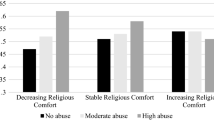Abstract
It is well established in the literature that married people have a higher level of subjective well-being than the never married, widowed, or divorced/separated. However, previous research has yielded conflicting results on changes in the relationship between marital status and well-being. American happiness data in particular provide evidence of a declining relationship, whereas other studies suggest the opposite trend. The present study analyzes time trends in the relationship between marital status and two outcome measures, suicide rates and self-reported distress. The hypothesis that the relationship between marital status and these well-being indicators has declined during the last 10–20 years is clearly rejected. There is even some evidence that the relative position of never married men has become more unfavorable during this period. However, the causal interpretation of these trends is problematic.
Similar content being viewed by others
References
Barrera, M.: 1988, ‘Models of social support and life stress’, in L. H. Cohen (ed.) Life Events and Psychological Functioning (Newbury Park, CA: Sage University Press).
Bernard, J.: 1975, ‘Comments on Glenn's paper’, Journal of Marriage and the Family 37, 601–602.
Bernard, J.: 1982, The Future of Marriage 2nd ed. (New York: Bantam).
Blom, S. and O. Listhaug: 1988, ‘Familie og livskvalitet’, Tidsskrift for Samfunnsforskning 29, 5–28.
Danigelis, N. and W. Pope: 1979, ‘Durkheim's theory of suicide as applied to the family: An empirical test’, Social Forces 57, 1080–1106.
Douglas, J.: 1967, The Social Meanings of Suicide (Princeton, N.J.: Princeton University Press).
Glenn, N. D.: 1975, ‘The contribution of marriage to the psychological well-being of males and females’, Journal of Marriage and the Family 37, 594–601.
Glenn, N. D.: 1991, ‘The recent trend in marital success in the United States’, Journal of Marriage and the Family 53, 261–270.
Glenn, N. D. and C. N. Weaver: 1988, ‘The changing relationship of marital status to reported happiness’, Journal of Marriage and the Family 50, 317–324.
Goldscheider, F. K. and L. J. Waite: 1986, ‘Sex differences in the entry into marriage’, American Journal of Sociology 92, 91–109.
Haring-Hidore, M., W. A. Stock, M. A. Okun and R. A. Witter: 1985, ‘Marital status and subjective well-being: A research synthesis’, Journal of Marriage and the Family 47, 947–953.
Kisker, E. E. and N. Goldman: 1987, ‘Perils of single life and benefits of marriage’, Sociol Biology 34, 135–152.
Kitsuse, J. I. and A. V. Cicourel: 1963, ‘A note on the uses of official statistics’, Social Problems 11, 131–139.
Lee, G. R., K. Seccombe and C. L. Shehan: 1991, ‘Marital status and personal happiness: An analysis of trend data’, Journal of Marriage and the Family 53, 839–844.
Lin, N.: 1986, ‘Modeling the effects of social support’, in N. Lin, A. Dean and W. M. Ensel (eds.) Social Support, Life Events, and Depression (Orlando, FL: Academic Press).
Livi-Bacci, M.: 1984, ‘Selectivity of marriage and morality: Notes for future research’, in N. Keyfitz (ed.) Population and Biology (Liege: Ordina Editions), 95–108.
Maddala, G. S.: 1983, Limited-Dependent and Qualitative Variables in Econometrics (Cambridge: Cambridge University Press).
Martin, W. I.: 1976, ‘Status integration, social stress, and mental illness: Accounting for marital status variations in mental hospitalization rates’, Journal of Health and Social Behavior 17, 280–294.
Mastekaasa, A.: 1992a, ‘Marital status and psychological well-being over the life cycle: Some tentative evidence on marriage and selection effects’, Revised version of paper presented at the 3rd National Conference of Sociology, Mortsund, June 18–21.
Mastekaasa, A.: 1992b, ‘Marital status, distress, and well-being: An international comparison’, Forthcoming in Journal of Comparative Family Studies.
Mastekaasa, A.: 1993, ‘Marriage and psychological well-being: Some evidence on selection into marriage’, Journal of Marriage and the Family 54, 901–911.
Mellström, D.: 1986, ‘Secular trends in mortality in relation to social network in Sweden’, in S. Isacsson and L. Janzon (eds.) Social Support — Health and Disease (Stockholm: Almquist & Wicksell).
Mergenhagen, P. M., B. A. Lee and W. R. Gove: 1985, ‘Till death do us part: Recent changes in the relationship between marital status and mortality’, Sociology and Social Research 70, 53–56.
Naess, S. and Ø. Bergwitz: 1991, ‘Ekteskapet — best for menn’, Tidssdrift for Samfunnsforskning 32, 313–330.
Rosengren, A., H. Wedel and L. Wilhelmsen: 1989, ‘Maritial status and mortality in middle-aged Swedish men’, American Journal of Epidemiology 129, 54–64.
Smith, J. C., J. A. Mercy and J. M. Conn: 1988, ‘Marital status and the risk of suicide’, American Journal of Public Health 78, 78–80.
Trovato, F. and G. Lauris: 1989, ‘Marital status and mortality in Canda: 1951 to 1981’, Journal of Marriage and the Family 51, 907–922.
Veenhoven, R.: 1983, ‘The growing impact of marriage’, Social Indicators Research 12, 49–63.
Velleman, P. F. and D. C. Hoaglin: 1981, Applications, Basics, and Computing of Exploratory Data Analysis (Boston: Duxbury Press).
Verbrugge, L. M.: 1979, ‘Marital status and health’, Journal of Marriage and the Family 41, 267–285.
Verbrugge, L. M. and J. H. Madans: 1985, ‘Social roles and health trends of American women’, Milbank Memorial Fund Quarterly/Health and Society 63, 691–735.
Author information
Authors and Affiliations
Rights and permissions
About this article
Cite this article
Mastekaasa, A. Marital status and subjective well-being: A changing relationship?. Soc Indic Res 29, 249–276 (1993). https://doi.org/10.1007/BF01079515
Accepted:
Issue Date:
DOI: https://doi.org/10.1007/BF01079515




